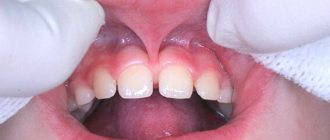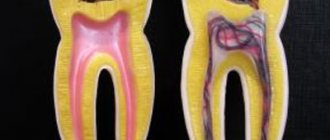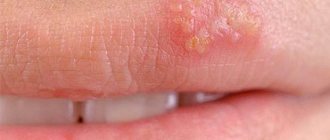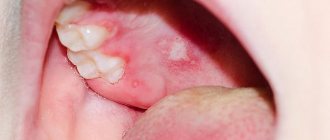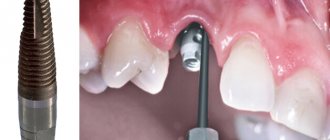How does primary infection occur?
Often, the initial infection with a herpes infection has no symptoms and is not noticeable. But it happens that complications appear along with herpes:
- gingivostomatitis - inflammation of the oral mucosa and gums;
- an increase in temperature, accompanied by the appearance of blisters and ulcers in the mouth;
- herpetic panaritium (inflammation of the finger tissue) - the infection can spread to the fingers if they are pulled into the mouth;
- rashes can occur throughout the oral cavity, affecting the gums, which turn red and bleed. The child refuses to eat because the process becomes painful.
Symptoms of the herpes virus
Herpes simplex virus 1 causes oral and, less commonly, genital herpes. Such herpes is characterized by the formation of small blisters in the amount of one to ten pieces, they are located in groups, and inside are filled with serous exudate. Gradually, the blisters open, and in their place crusts form, which disappear on the 6th day of the disease.
After this, subtle pigmentation remains, which goes away independently and without a trace at the end of recovery. Typical clinical picture: the formation of painful blisters filled with serous fluid in the lip area; itching and burning in places where skin elements appear; loss of appetite, increase in body temperature (rare). With adequate treatment, signs of the disease can disappear after 3-4 days.
The formation of blisters is accompanied by severe itching, pain and burning at the site of the pathological process. Systemically, fever and enlarged lymph nodes may occur. With oral herpes, the blisters are localized around the mouth and wings of the nose. The genital form of the disease manifests itself with characteristic symptoms on the mucous membrane of the genital organs.
A typical sign of genital herpes is the appearance of small (2-5 mm), fluid-filled blisters on the genitals, buttocks and anus. The rash is accompanied by itching and/or pain. The rash can be located in the vagina, on the cervix, or in the rectum. Within a few days, the blisters burst, turning into painful sores. After 1-2 weeks, the ulcers become covered with crusts and heal. Other manifestations: pain in the groin or inner thighs, painful urination, vaginal discharge in women or from the urethra in men.
Primary infection lasts about 3 weeks with pronounced manifestations. After the initial episode of the disease, exacerbations occur several times (usually 4–5) during the year. In the future, the number of exacerbations decreases, the severity of manifestations decreases.
How to fight a “cold”?
If herpes appears for the first time or in a baby under 6 months, and the disease is accompanied by fever and affects not only the lips, then you need to consult a pediatrician for antiviral therapy.
Often recurrent infections go away on their own. But you can shorten their duration by using local antiherpetic agents (active ingredient acyclovir).
Ways to reduce discomfort:
- apply a cold compress to the area of the rash;
- avoid sour and spicy foods;
- choose cool drinks;
- if there is severe pain, then use ibuprofen or paracetamol;
- Do not use products containing lidocaine due to possible side effects or overdose.
How to prevent the spread of the virus:
- it is important to ensure that the child does not scratch the rash and wash his hands;
- use individual dishes, towels, toothbrushes for a child with a herpes infection;
- during an exacerbation, you should not engage in contact sports;
- a child with a “cold” on his lips should not kiss other people.
Diagnostics
Diagnosis includes visual inspection of the patient's clinical manifestations if an exacerbation is typical. The diagnosis of HSV infection is often based on clinically characteristic lesions. Laboratory confirmation may be necessary if the infection is severe, the patient is immunocompromised, or the patient is pregnant, and the lesions are atypical. Depending on the severity of the clinical picture, a number of necessary auxiliary diagnostic procedures are performed:
- a set of standard laboratory tests (general blood test, urine test, etc.);
- serological tests (ELISA) to detect antibodies to a specific type of virus in the patient’s blood;
- PCR analysis is a highly informative diagnostic method that allows you to detect the presence of a virus in the body with up to 99% accuracy.
Herpes simplex virus must be distinguished from herpes zoster, which rarely recurs and usually causes more severe pain and larger lesions that are distributed along the dermatome and usually do not cross the midline. It should also be noted that collections of vesicles or ulcers on an erythematous basis are uncommon in genital lesions other than those caused by HSV infection.
Treatment and prevention of herpes
The main goal of herpes treatment is to relieve symptoms of the disease and reduce the frequency of relapses. To eliminate the symptoms of oral and genital herpes, ointments and tablets that have a specific antiviral effect are used. The most effective medications for people infected with HSV are antiviral drugs such as acyclovir, famciclovir and valacyclovir. Both tablets and injections, as well as ointments and topical creams are used. To prevent relapses, immunostimulating drugs are prescribed to restore and maintain immunity. They help relieve symptoms and reduce the frequency of their occurrence, but do not lead to a complete cure. It is impossible to completely recover from herpes - the virus remains in the human body for life after the initial infection.
At first glance, it may seem that herpes virus infection is quite harmless. But in fact, it can lead to serious complications:
- In people with weakened immune systems (for example, HIV-infected people), herpes is more severe and often recurs. In rare cases, HSV-1 causes encephalitis (inflammation in the brain), keratitis (inflammation of the cornea of the eye). Herpetic encephalitis leads to death in 30% of cases; after treatment, it leaves serious consequences in the form of persistent paralysis and paresis, and dementia.
- HSV-2 infection increases the risk of human immunodeficiency virus infection.
- In 1 out of 10,000 cases, a child becomes infected during childbirth, and neonatal herpes develops, which leads to severe neurological disorders and death of the newborn. The risks are especially high if the expectant mother becomes infected late in pregnancy.
This is why disease prevention is so important. HSV-1 is most contagious when oral herpes symptoms appear, but it can also be transmitted when no symptoms are felt or observed. Persons with active symptoms of oral herpes should avoid oral contact with other people and sharing household items (dishes, towels, etc.). Patients are also advised to abstain from oral sex to prevent herpes from spreading to the genitals of their sexual partner. People with symptoms of genital herpes should avoid having sex while they have symptoms.
Back to articles
Signs
Before a tumor appears in the intended area, tingling, pain, tingling, and itching are felt. The causative agent of herpes causes both swelling, inflammation, and ulcers, blisters that contribute to the formation of swelling
This area of skin becomes red and swollen, and small blisters appear. The contents are initially transparent, but then become cloudy. Further, after the bubbles rupture, erosions form and become covered with crusts.
The onset of the disease manifests itself in an acute form. There is an enlargement of the lymph nodes, and the level of antibodies in the blood serum increases. Severe cases are characterized by fever, sweating, and general malaise.
To prevent the appearance of a tumor and the further maturation of blisters, appropriate medications should be used as early as possible. The tumor may become larger after some time. In this case, it is necessary to apply lotions, moisturizing the wound so that there are no cracks.
More: Herpes on the lips - prevention, as a means of protection
How to treat swelling?
When a person develops herpes, there are different ways to remove swelling from the lip. The use of ointments and creams based on acyclovir can help stop the process of relapse of the disease, bring you closer to a speedy recovery and get rid of lip swelling.
The composition contains zinc, l-lysine, hydroxytolene. These medications can quickly heal ulcers and blisters and reduce itching.
It is necessary to use acyclovir, zovirax ointment with a cotton swab, since when applied with your fingers, you can transfer the infection to the palms and other areas of the skin.
These drugs contain components that destroy the manifestations of herpes, relieve pain and heal. Use at least 5 times a day for a week. The ointment should be applied regularly until the blisters disappear completely and then used for another 2 days.
Your doctor may prescribe the drug valacyclovir, in tablet form. If you take 2 tablets of valacyclovir in the morning and evening, you will notice that the affected area heals quickly, and the symptoms of a cold and lip swelling are blocked.
If the affected area is small and does not cause severe pain, you can use antiviral ointments such as Herpevir, Zovirax. They will help the wounds heal quickly.
More: Manifestations of herpes on the lips, is it possible to get rid of the problem
At the first symptoms of herpes, you should change your diet. It is not recommended to eat fatty and salty foods, drink beer, chocolate, peanuts, as these products favor the development of herpes infection. Also, you should not kiss during the period of illness, avoid kissing children. In childhood, the body is more susceptible to infection.
When the occurrence of herpes occurs very often, you should visit a doctor. This course of the disease may be due to problems in the lymphatic system.
Herpes: symptoms, diagnosis and treatment
Itching, soreness, redness of the skin, blisters... Really again? Those who have encountered it more than once will “recognize” these symptoms as manifestations of herpes. What kind of virus is this? For what reasons does he regularly harass some people?
Our interlocutor, candidate of medical sciences, dermatovenerologist at the Expert Tula Clinic, Vladislav Leonidovich Sheinkman, told us about this and much more.
— What is herpes and how common is it among the inhabitants of our country?
This is a group of diseases caused by herpes viruses. One of the most common types is the herpes simplex virus, which is divided into herpes types 1 and 2, as well as the varicella zoster virus and herpes zoster virus.
Almost all people in Russia are infected with the herpes simplex virus. Once the virus enters the body, it never leaves it. Usually it is in the body in an inactive, “sleeping” state and does not bother a person.
— Is herpes a fungus, a virus or a bacterium?
It's a virus.
— Where does the herpes virus hide in the body?
Herpes simplex viruses are usually found in the so-called nerve ganglia (for example, in the trigeminal ganglion, sacral ganglia).
— How does infection with the herpes virus occur? Who is at risk for herpes infection?
Infection usually occurs in childhood. There are several ways of infection. This is airborne, contact household (dishes, household items, etc.), sexual.
What is immunity and how to increase it? Allergist-immunologist at Clinic Expert Smolensk tells
Chemova Ulyana Vladimirovna
The risk of virus activation occurs in the presence of so-called cofactors. These include weakened immunity, emotional distress, stress, alcohol consumption, climate change (for example, travel), menstruation, prolonged exposure to the sun or hypothermia, the presence of infection (ARVI, pneumonia, sinusitis, etc.).
Is it possible to treat sinusitis without a puncture? Otolaryngologist at the Expert Kursk Clinic, Candidate of Medical Sciences Alexandra Nikolaevna Emelyanova tells
— Tell us about the most common symptoms of herpes
Herpes occurs cyclically in the body, and its symptoms depend on the stage of the process.
The first, so-called prodromal stage, is characterized by burning, itching, and a tingling sensation in the area of future localization of herpes manifestations. The duration of this period can be several hours.
In the second stage, redness and thickening of the skin or mucous membrane appear in the form of a spot (erythematous stage). This stage of herpes lasts about a day.
At the third stage, small bubbles (2-3 mm in size) appear, which can “merge” with the serous or serous-purulent contents. Depending on the severity of the flow, the number of bubbles may vary.
In the fourth stage, the blisters break open and painful ulcers form in their place. This stage of herpes lasts several days and is the most contagious to others.
By the fifth stage, the ulcers dry out and form crusts.
And finally, at the sixth stage, the crusts fall off and the skin or mucous membrane is restored.
With type 1 herpes simplex virus, manifestations occur on the skin and mucous membranes of the upper half (for example, the lip area, nasolabial fold, neck), and type 2 - on the lower half of the body (otherwise it is called “genital herpes,” although Other areas may also be affected - for example, the buttock area, etc.).
In the recurrent form, the localization is usually stable.
— Is herpes on the lips contagious to others?
Absolutely yes.
— Does a herpetic infection always manifest itself with pronounced symptoms, or may a person not suspect that he is a carrier of the infection?
If a herpetic infection is also understood as a pure carrier state, then symptoms may not always be present. If a person has a strong immune system, he may not even know that he has such a virus.
The manifestations of exacerbation also vary from person to person. People with a normal but temporarily slightly weakened immune system, or those receiving some kind of antiviral treatment, may have a different severity of symptoms than a person with a severe illness (for example, tuberculosis), a severely weakened immune system (for example, HIV infection, chemotherapy, for organ transplants, etc.).
What are the symptoms of tuberculosis? Read more
— How is the herpes virus detected in humans?
Diagnosis of herpesvirus infection is primarily based on an examination by a dermatovenerologist.
To confirm the diagnosis, laboratory methods may be prescribed by the doctor. Some of them are used to detect the virus itself, while others are indicators of the immune response to the virus.
To search for the virus itself, polymerase chain reaction (PCR) is used, when material is taken from the site of the lesion and examined for the presence of virus nucleic acids.
An enzyme-linked immunosorbent assay (ELISA) is used to confirm the presence of an immune response against the virus. Imagine this situation. A person does not have any manifestations of herpes, and besides, he does not remember whether he ever had them or not. How to find out whether an organism has “met” the virus or not? If, when performing ELISA, specific antibodies are detected - immunoglobulins of class G (IgG) against the herpes virus, this means that there was once an infectious process, and the virus is currently in an inactive state. These antibodies are usually found throughout a person's life. If there is a suspicion of virus activation, then, in addition to PCR, an analysis for class M immunoglobulins (IgM) may be prescribed according to indications. The detection of this type of antibody indicates an exacerbation of the process. Outside of an exacerbation, only IgG is detected.
— For whom can the herpes virus be dangerous?
First of all, these are persons with serious diseases (for example, tuberculosis, oncological pathologies, immunodeficiencies). In them, the manifestation of herpes can be severe, affecting areas that are not usually found under other conditions (for example, the optic nerve).
— How to get rid of herpes? Is it enough to use only ointment or cauterize the wounds with brilliant green?
This depends on a number of factors - in particular the prevalence of the process, the frequency and severity of relapses. Often local treatment is not enough. There are certain standards and principles for the treatment of herpes, which consist in the use of antiviral drugs and agents to improve/correct the functions of the immune system.
— There are recommendations on the Internet to use tea bags or sage infusion to relieve itching from herpes. Do traditional methods really help in treating herpes infections?
The use of such methods may complicate the doctor’s work, i.e. making the correct diagnosis and prescribing effective treatment.
— What could be the consequences if herpes is not treated?
Mainly - frequent relapses, with the appearance of more common forms during exacerbations, with more severe symptoms.
— What specialty does a doctor treat herpes?
Dermatovenerologist.
You can make an appointment with a dermatovenerologist here
Please note: the service is not available in all cities
— Are effective methods of preventing herpes known to modern medicine?
Undoubtedly. It is necessary to identify and eliminate cofactors that lead to exacerbation of herpes. The main ones are stress, hypothermia or overheating, excessive alcohol intake, exposure to the sun, climate change and a number of others.
For reference:
Sheinkman Vladislav Leonidovich
Graduate of the pediatric faculty of the Smolensk State Medical Institute in 1994.
From 1994 to 1995, he completed an internship, and from 1996 to 1998, a clinical residency in the specialty “Dermatovenereology”.
Has an academic degree of Candidate of Medical Sciences.
Currently working at Clinic Expert Tula LLC as a dermatovenerologist. Provides reception at the address: st. Boldina, 74

